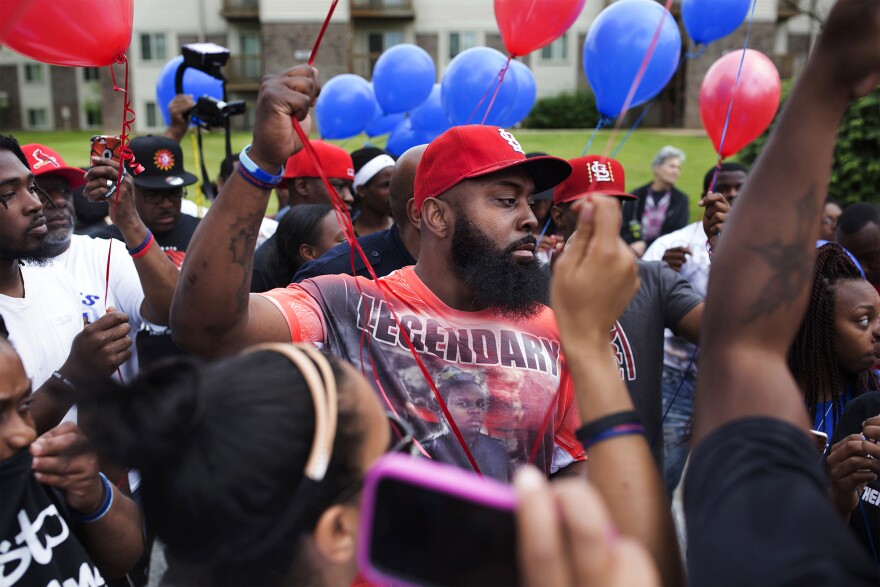Michael Brown's death in Ferguson, Mo., sparked a national civil rights movement around how police and government treat black residents. Yet even as the political momentum around police accountability picked up in other places, some candidates and policies that emanated from the movement stalled around St. Louis and Missouri.
But there's a big shift over the past year in St. Louis County, the place where a Ferguson police officer shot and killed Brown five years ago. A multiracial coalition banded together to elect Wesley Bell as St. Louis County's first African American prosecutor. He ousted Bob McCulloch, who was in office when a grand jury declined to bring charges against the police officer who shot Brown.
"The criminal justice system is predicated on trust. And people feeling that they have a voice and that voice is being heard," Bell said. "And what we saw in Ferguson was a symptom of a much larger problem that people didn't feel that the system, the justice system, actually worked for them. And just to be clear on that because I've knocked on doors all over this county."

Since he took the oath of office earlier this year, Bell has aggressively sought to implement ideas that gained favor after Brown's death — including setting up a unit within his office to investigate instances when police use deadly force. He also wants to steer low-level offenders into diversion programs that emphasize rehabilitation instead of prison.
"Just the fact that someone like myself in this office with those types of policies, which 10 years ago would have been unheard of, are signs that we're heading in the right direction," he said.
"We need to do better"
There's evidence that Bell's win is trickling down into the rest of St. Louis County government. Since taking over in late April after his predecessor's resignation, St. Louis County Executive Sam Page has successfully pushed for the county police department to be equipped with body cameras. He's working with white and black county council members to overhaul the county's jail and to make it illegal for some landlords to discriminate against tenants who use Section 8 vouchers.

"St. Louis recognizes that we need to do better," Page said. "There's a broad coalition that isn't just based in a racial footprint that believes this. Even folks with more conservative philosophical underpinnings recognize that we need to do something different in St. Louis County."
There's been some modest progress in the Missouri General Assembly in enacting policy changes stemming from the Ferguson protests. Lawmakers went after cities that heap big traffic fines on motorists. Both political parties embraced overhauls to the criminal justice system, including focusing on mandatory minimum sentences.
But unlike some other state legislatures, Missouri lawmakers haven't sought to change how police officers are investigated or how they're trained. And legislators from some St. Louis suburbs such as state Rep. Shane Roden say the Ferguson protests have backfired among their constituents.
"The people from Jefferson County from the outside view were mad," Roden said. "I mean, it's an absolute disgrace — this is what happens when politics get involved in law enforcement issues."
The pushback to Ferguson activism cascaded into national politics, where Donald Trump's bellicose rejection of the protest movement was part of his campaign for president. Cori Bush, a Ferguson demonstrator who unsuccessfully ran for Congress, said she has been frustrated to see politicians making complete support of law enforcement part of their campaign pitch.

"One thing that would really drive me nuts when people would say 'I stand 100% with law enforcement.' You don't stand 100% with your spouse. So let's stop that," Bush said. "One thing we would always see on the ground, we would say 'Black Lives Matter.' And the response would be 'Blue Lives Matter' — when the response is really just yes. Yes they matter."
Other activists believe that it's deceptive to use election results and passed bills as a measuring stick for progress. They also contend that five years isn't nearly enough time to wipe out housing and education segregation — or racism and distrust throughout St. Louis that has been in place for generations.
American problems
Bell, the recently sworn in prosecutor in St. Louis County, said he has noticed that people here now seem more willing to talk openly with each other about inequity and racism. And he says those tough discussions among ordinary people are critical.

"One thing I will say about Ferguson is whatever side of the spectrum you're on with respect to any of these issues, more than likely you've at least had an uncomfortable conversation or two or three about these issues," Bell said. "And so, you do at least see book clubs on race, community town halls of these types of issues. And we're seeing it throughout the region.
"These issues have to be addressed as more than just African American or black or brown problems," he added. "They have to be addressed for what they are — American problems."
Copyright 2020 St. Louis Public Radio. To see more, visit St. Louis Public Radio. 9(MDAwMzY5MzE4MDEzMTE3ODg5NDA4ZjRiNg004))


